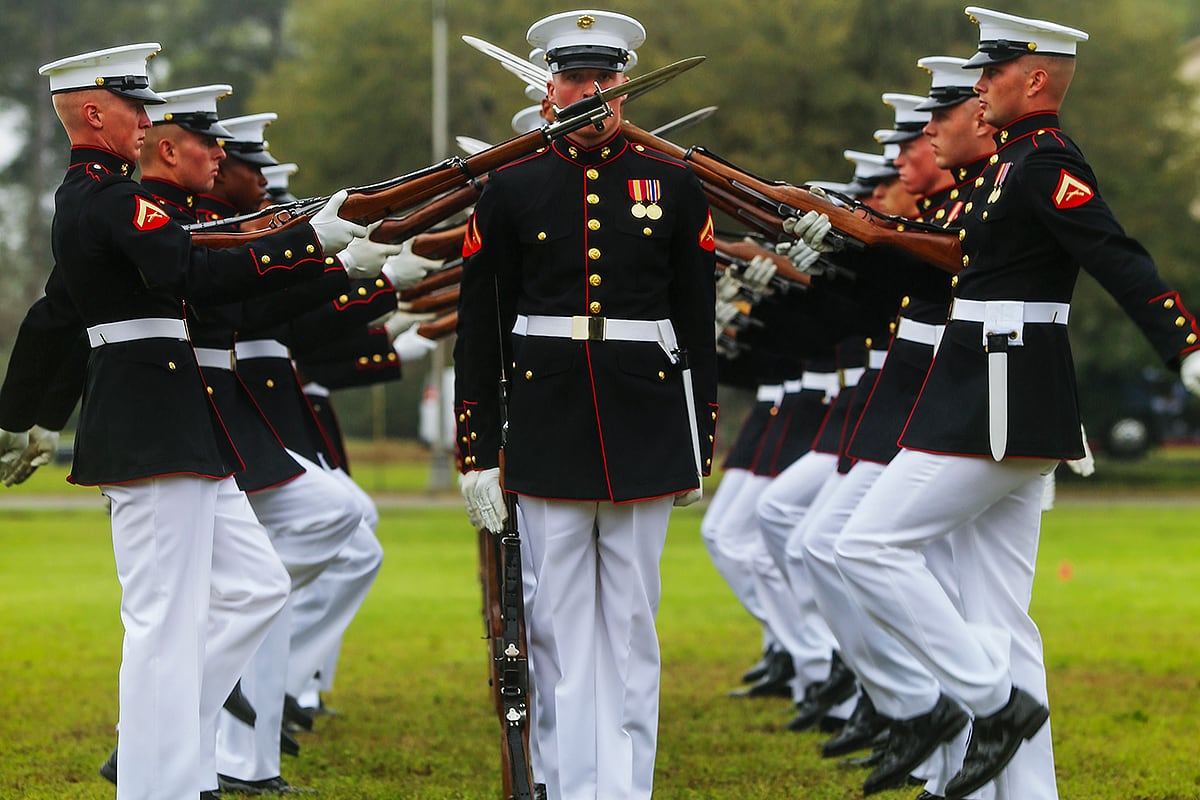A hazing investigation by Naval Criminal Investigative Service into the Corps’ Silent Drill Platoon resulted in at least five Marines being punished ― three of whom recently were separated from the Corps, according to officials.
The completed hazing investigation into one of the most famous units in the Marines Corps shines a small spotlight into the commandant’s backyard at one of its oldest garrisons, the Washington barracks.
Following a nearly four-month NCIS investigation that kicked off in November 2018, three Marines were charged with and pleaded guilty to Article 81 conspiracy and Article 92 failure to obey an order or regulation, Sgt. Maj. Matthew Hackett, the sergeant major for the D.C. barracks, told Marine Corps Times in an interview.
Those Marines spent about 25 and 49 days in pretrial confinement at the Rappahannock Regional Jail in Stafford, Virginia, Hackett said.
Following release, each received nonjudicial punishment, or NJP, which consisted of reduction in rank, 60 days restriction, forfeiture of one-half of a month’s pay for two months with one month suspended by the commanding officer. All faced administrative separation from the Marine Corps, according to Hackett.
Two other Marines pleaded guilty to Article 92 and Article 134 general article. Those two Marines spent 4–5 days in confinement.
Following a short confinement, the two Marines received NJPs, which consisted of reduction in rank, 45 days restriction, 45 days extra duty, and forfeiture of one-half month’s pay for two months with one month suspended, Hackett said.
Some of the hazing incidents involved assault with a closed and open fist and the use of a rifle buttstock with a nonfunctioning training rifle as a weapon. The five Marines punished for hazing included noncommissioned officers and junior ranking Marines.
Sexual assault allegations were also investigated, with NCIS determining there was not enough evidence to convict, Hackett said.
RELATED

The Marines were placed in pretrial confinement to protect other Marines from hazing or retaliation, he said.
The Corps’ marching 24 members of its Silent Drill Platoon are revered across the Corps and are charged with conducting close order drill with no voiced commands.
Their performances, which include spinning rifles and perfectly timed precision drill movements, have dazzled crowds in the Washington, D.C., area for decades.
Its elite status among Marines, and those who have had the opportunity to watch their performance during parade ceremonies, has at times made it a magnet for hazing within the unit.
Some Marines who have hailed from the unit have boasted of hazing within the organization as a prideful right of passage — an unfortunate common occurrence within some of the Corps’ prestigious and elite units.
The Silent Drill Platoon’s celebrity status has made stamping out hazing within the unit a difficult task for Corps leaders.
But the D.C. barrack’s sergeant major says he believes it’s preventable.
“I think we can eradicate it from our ranks,” Hackett told Marine Corps Times.
The sergeant major says he teaches a required annual training hazing awareness class that discusses some of the unit’s past issues with hazing. He also noted that the Silent Drill Platoon members attend additional hazing classes at the nearly two-month silent drill school.
“You have to make it [hazing classes] personal,” Hackett explained. “If it’s just PowerPoint, punch and go, you’re missing the point."
That education, he argues, is bearing fruit.
The investigation into hazing within the SDP kicked off after a Marine came forward with allegations following the unit’s annual hazing training, which took place Oct. 31, 2018.
“This wasn’t a case where a senior Marine walked in on a hazing evolution,” Hackett said.
Hackett said that eradicating hazing from some of the Corps’ more prestigious and elite units is “about being humble.”
“You have the honor, dignity and respect to be part of a unit that’s been handed to you and given to you,” he said. “But you don’t own it.”
The Corps, especially California-based 1st Marine Division, has struggled with combating hazing within its ranks, which often has been connected to Marines returning from combat deployments.
And those Marines who return home from combat overseas, Hackett says, “to come home, the honor of carrying that is not put on a T-shirt, it’s carried within.”
Following the hazing investigation, the SDP and schoolhouse have instituted some changes that will include more oversight at the battalion level “to ensure any elitist mindset is eliminated,” Gunnery Sgt. John Jackson, a spokesman with the D.C. barracks, told Marine Corps Times in an emailed statement.
“The training goals remain the same,” Jackson said, but the “more engaged battalion and platoon-level supervision ensure the platoon remains focused and the Marines are being trained within a professional atmosphere.”
Shawn Snow is the senior reporter for Marine Corps Times and a Marine Corps veteran.





